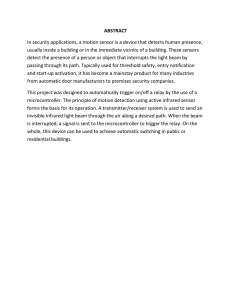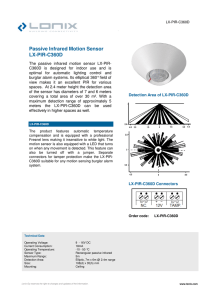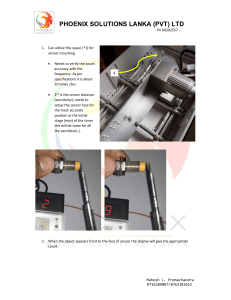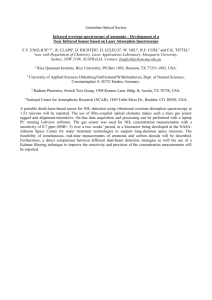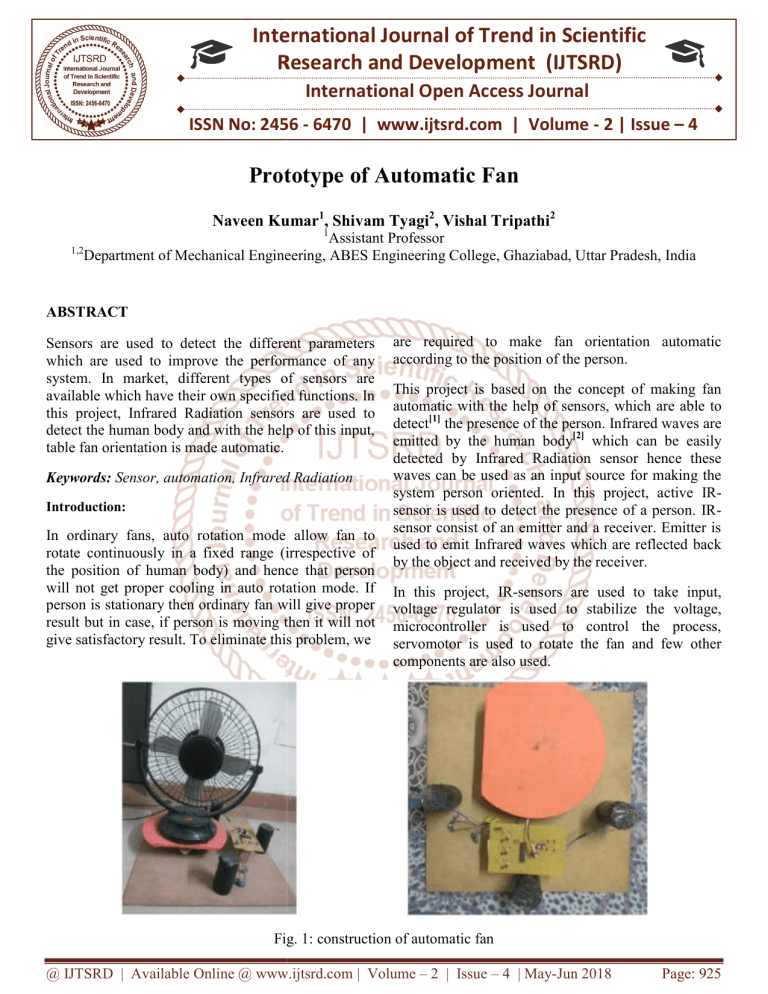
International Journal of Trend in Scientific Research and Development (IJTSRD) International Open Access Journal ISSN No: 2456 - 6470 | www.ijtsrd.com | Volume - 2 | Issue – 4 Prototype of Automatic Fan Naveen Kumar umar1, Shivam Tyagi2, Vishal Tripathi2 1 1,2 Assistant Professor Department of Mechanical Engineering, ABES Engineering College, Ghaziabad, Uttar Pradesh, India ABSTRACT Sensors are used to detect the different parameters which are used to improve the performance of any system. In market, different types of sensors are available which have their own specified functions. In this project, Infrared Radiation sensors are used to detect the human body and with the help of this input, table fan orientation is made automatic. Keywords: Sensor, automation, Infrared Radiation Introduction: In ordinary fans, auto rotation mode aallow fan to rotate continuously in a fixed range (irrespective of the position of human body) and hence that person will not get proper cooling in auto rotation mode. If person is stationary then ordinary fan will give proper result but in case, if person is moving then it will not give satisfactory result. To eliminate this problem, we are required to make fan orientation automatic according to the position of the person. This project is based on the concept of making fan automatic with the help of sensors, sensor which are able to [1] detect the presence of the person. Infrared waves are emitted by the human body[2] which can be easily detected by Infrared Radiation sensor hence these waves can be used as an input source for making the system person oriented. In this project, active IRIR sensor is used to detect the presence of a person. IRIR sensor consist of an emitter and a receiver. Emitter is used to emit Infrared waves which are reflected back by the object and received by the receiver. In this project, IR-sensors ors are used to take input, voltage regulator is used to stabilize the voltage, microcontroller is used to control the process, servomotor is used to rotate the fan and few other components are also used. Fig. 1: construction of automa automatic fan @ IJTSRD | Available Online @ www.ijtsrd.com | Volume – 2 | Issue – 4 | May-Jun Jun 2018 Page: 925 International Journal of Trend in Scientific Research and Development (IJTSRD) ISSN: 2456-6470 Proposed method: In this proposed method, a low cost prototype of automatic fan is made with the help of IR sensor and other components required to make fan rotation automatic[3]. Three IR sensors area used which are at 90° with respect to each other. When any person will move[3], one out of three sensor will detect the person and corresponding input will be provided to the microcontroller which will rotate the fan into the corresponding direction. Fig. 2: system architecture Hardware specification: 2. Microcontroller: 1. IR sensor: ATmega microcontrollers belong to the AVR family of microcontroller. An ATmega microcontroller is an 8-bit microcontroller with reduced instruction set based Harvard Architecture. It has standard features like on-chip ROM, data RAM, data EEPROM, timers and input/output ports etc. they have 120 and more instruction set and program memory from 4K to 256K Bytes. IR sensor is the device which is used to detect the infrared waves emitted by either any source or itself. In this project, we are using an active IR sensor which will detect the person by receiving the infrared waves emitted by the emitter. An infrared sensor circuit is basic and popular circuit module. This circuit comprises of: Transmitter and receiver pair Resistors LED(Light Emitting Diode) Fig.3: IR sensor transmitter and receiver The data memory is divided to three parts- 32 general purpose registers, Input/output memory and Internal Static Random Access Memory. While the size of General Purpose Registers is fixed, the I/O Memory and internal SRAM size varies from chip to chip. Fig.4: ATmega microcontroller @ IJTSRD | Available Online @ www.ijtsrd.com | Volume – 2 | Issue – 4 | May-Jun 2018 Page: 926 International Journal of Trend in Scientific Research and Development (IJTSRD) ISSN: 2456-6470 3. Servomotor: The servomotor is most commonly used for high technology devices in the industrial application like automation technology. It is self-contained electrical device, that rotate parts of a machine with high efficiency and great precision. In this project, continuous rotation servomotor is used and allowed to move maximum angle of 180°. 1) M. Sathishkumar, S.Rajini,” Smart Surveillance System Using PIR Sensor Network and GSM”, International Journal of Advanced Research in Computer Engineering & Technology (IJARCET) Volume 4 Issue 1, January 2015. 2) M. Shankar, 1. Burchett, Q. Hao, B. Guenther, "Human tracking systems Using pyroelectric infrared detectors", Optical Engineering, vol. 10, no. 45, pp. 106401 (01-10), Oct. 2006. 3) Emin Birey Soyer,” Pyroelectric Infrared (PIR) Sensor Based Event Detection”, July 2009. 4) M. Thuillard, “Method and Device for Detecting Fires Based on Image Analysis.” US Patent 6,011,464, 1998. 5) F. C. Carter, and N. Cross, “Combustion monitoring using infrared array based detectors”, Measurement Science and Technology, vol. 14, pp. 1117–1122, 2003. Fig.5: Servomotor Conclusion and future work: In this project, IR sensor is used which is cheap and consumes less power. This system can be used for special purpose like cabin. This system can be improved and can be used where more than one person is available. The IR sensors used in this project have less range which can be increased by using other sensors like thermal camera[4],[5]. Naveen Kumar graduated in Mechanical Engineering and earned his Masters degree in Production and Industrial Engineering. In present time, he is working as Assistant Professor in Mechanical Engineering Department at ABES Engineering College, Ghaziabad, India. He has almost seven years of teaching experience and has published two research papers in international journals. References: @ IJTSRD | Available Online @ www.ijtsrd.com | Volume – 2 | Issue – 4 | May-Jun 2018 Page: 927
